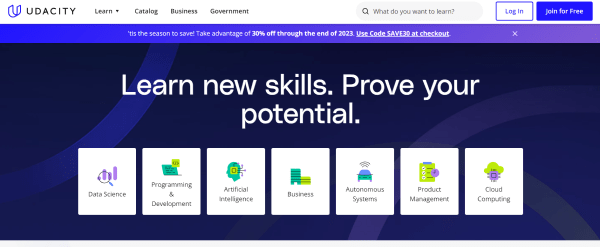Udacity Enrollment Guide, a prominent online learning platform, has solidified its position as a prominent contender in the domain of digital education, with a notable focus on the technology and data science sectors. Established in partnership with Stanford University, Udacity provides an array of nanodegrees and courses meticulously crafted to bestow industry-relevant competencies. Known for its industry-focused curriculum, Udacity collaborates with tech giants to ensure its offerings are aligned with current market demands. While primarily targeting professionals seeking to upskill or change careers, its flexible, project-based learning approach appeals to a wide audience. However, the cost-effectiveness and value of Udacity’s programs can vary based on individual career goals and geographical location.
What’s in this article?
- 1 What is Udacity?
- 2 Understanding udacity’s Offerings
- 3 Online Courses Offered by Udacity
- 4 How much does Udacity cost?
- 5 Is the Udacity nanodegree useful for anyone from anywhere?
- 6 Is Udacity worth the money?
- 7 FAQs:
- 7.1 1. Do people enrolling in the Nanodegree Program at Udacity get a Udacity T-shirt?
- 7.2 2. Can you complete a Udacity Nanodegree weekly?
- 7.3 3. What are the requirements for Udacity’s AI Nanodegree program?
- 7.4 4. Can I pause the Udacity Nanodegree?
- 7.5 5. What are the downsides of the Nanodegree programs from Udacity?
- 7.6 6. How long can I access Udacity’s nanodegree content after completing the course?
- 8 Final Thoughts : Udacity Enrollment Guide
What is Udacity?
Udacity is an online learning platform that offers a diverse range of both paid and free courses designed to help individuals progress toward their career objectives. Additionally, Udacity Nanodegree programs, which are premium educational offerings focusing on technology and business.
Each Nanodegree consists of three to four individual courses, which learners can complete within a recommended timeframe. The culmination of a Nanodegree involves a project that empowers students to showcase their expertise in a specific subject matter.
These Nanodegree programs cater to learners at all skill levels, spanning from beginners to advanced individuals. Advanced courses may require prerequisite knowledge and proficiency in a given subject.
Understanding udacity’s Offerings
Udacity’s curriculum is structured around Courses and Nanodegrees. These offerings span a wide array of subjects, from Data Science and Artificial Intelligence to Programming and Digital Marketing. A Nanodegree at Udacity is a specialized, compact learning program designed to impart specific skills and knowledge pertinent to modern industry roles.
Quality and Industry Relevance
Udacity prides itself on its partnerships with industry leaders and universities. These collaborations ensure that course content is not only up-to-date but also has practical relevance. Real-world projects embedded in the curriculum enable learners to apply their knowledge in practical scenarios, making them job-ready.
Online Courses Offered by Udacity
Udacity provides an extensive selection of online courses and Nanodegree programs, each meticulously crafted to impart specialized expertise and proficiencies in various domains, with a particular focus on those highly sought-after in the technology sector. Here’s a synopsis of some of the primary domains and specific udacity courses available:
1. Data Science and Analytics
- Data Analyst Nanodegree: Teaches data processing, visualization, and statistical analysis using Python and SQL.
- Business Analytics Nanodegree: Focuses on basic data skills like Excel, SQL, and data visualization.
- Data Engineer Nanodegree: Covers the design and maintenance of data infrastructure.
- Data Product Manager Nanodegree: Combines data science with product management skills.
2. Artificial Intelligence and Machine Learning
- AI Product Manager Nanodegree: Teaches how to develop AI products.
- Machine Learning Engineer Nanodegree: Focuses on creating machine learning models.
- Deep Learning Nanodegree: Offers in-depth knowledge about neural networks.
- AI Programming with Python Nanodegree: Introduces Python, machine, Pandas, NumPy, and Matplotlib learning algorithms.
3. Programming and Development
- Full Stack Web Developer Nanodegree: Covers front-end and back-end development skills.
- Android Developer Nanodegree: Teaches Android app development.
- iOS Developer Nanodegree: Focuses on building apps for Apple’s iOS.
- C++ Nanodegree: specializes in C++ programming for software development.
4. Autonomous Systems and Robotics
- Self-Driving Car Engineer Nanodegree: Involves learning about autonomous vehicle systems.
- Robotics Software Engineer Nanodegree: Teaches robotics fundamentals and software development.
- Sensor Fusion Engineer Nanodegree: Focuses on sensor fusion technology used in autonomous vehicles.
5. Cloud Computing
- Cloud Developer Nanodegree: Covers cloud application development on platforms like AWS.
- Cloud DevOps Engineer Nanodegree: Teaches skills for developing and deploying infrastructure and applications on the cloud.
How much does Udacity cost?
Udacity offers both free and paid courses. The Nanodegrees, typically paid, vary in cost, with most falling around $399 per month under a pay-as-you-go model. Some programs offer a fixed price for a set duration, which can be more cost-effective. Though not traditionally accredited, many employers value these nanodegrees for their practicality.

Is the Udacity nanodegree useful for anyone from anywhere?
The value of a Udacity Nanodegree can fluctuate significantly based on an individual’s geographical location, career aspirations, current skill level, and the precise domain of study. Here are several factors to contemplate:

Career Goals and Industry Demand
- Relevance to Career Path: If the Nanodegree aligns with your career goals and is in a field with high demand, it can be very beneficial. For instance, tech-focused nanodegrees in areas like data science, AI, or web development are often aligned with current job market demands.
- Industry Recognition: In industries where up-to-date skills and practical experience are highly valued, Udacity’s project-based learning approach can be particularly advantageous.
Geographic Location
- Job Market Variances: The value of a nanodegree can depend on the job market in your location. In some regions, employers may place high value on such credentials, especially in the tech industry. In other areas, employers might prioritize traditional university degrees or other forms of certification.
- Networking Opportunities: Some regions may offer more networking and job opportunities for Udacity alumni, potentially through Udacity’s industry partnerships.
Existing Skill Level
- Novices vs. Seasoned Professionals: For individuals just starting their journey, a Nanodegree can serve as an invaluable means to acquire fundamental proficiencies in a fresh domain. Meanwhile, for those already established in their respective fields, it can offer an avenue for staying current and expanding existing skill sets.
- Hands-On Experience: The practical, project-based nature of the courses is beneficial for those who learn best by doing rather than through theoretical study alone.
Learning Style and Commitment
- Self-Paced Learning: Nanodegrees are self-paced, which is beneficial for those who need flexibility but require discipline and self-motivation.
- Mentorship and Community Support: Access to mentors and a community of learners can enhance the learning experience, especially for those who benefit from guidance.
Financial Consideration
- Return on Investment (ROI): Nanodegrees can be a significant financial investment. Assessing the potential ROI in terms of career advancement and salary increments is crucial.
- Scholarship Opportunities: For those who cannot afford the full cost, scholarships can make nanodegrees more accessible.
Certifications and Job Prospects
Completing a Nanodegree from Udacity often enhances job prospects. The platform boasts some success stories where alumni have advanced in their careers or pivoted to new roles. Udacity’s certifications are valued in the job market, particularly in the tech and digital sectors.
Accessibility and User Experience
While Udacity’s platform is robust and user-friendly, it lacks a dedicated mobile app, which might be a downside for mobile learners. However, the courses are accessible through web browsers, ensuring that learners can study even on the go, albeit with a different experience than a native app.
Scholarships and Financial Aid
Udacity periodically offers scholarships, often in partnership with industry giants. These scholarships make learning more accessible, especially for those who might find the cost prohibitive. The application process for these scholarships is straightforward but competitive.
Refund Policy and Commitment
Udacity’s refund policy is quite stringent, offering a brief 2-day window from the date of enrollment for a full refund. For EU residents, this period extends to 14 days. This policy underscores the importance of a thorough initial assessment of the course by the learner.
Is Udacity worth the money?
Whether Udacity is worth the money largely depends on individual goals and circumstances. The platform offers industry-relevant, skill-focused courses, especially valuable in the tech and data science fields.
The project-based learning approach provides practical experience, enhancing employability in specific sectors. Udacity’s courses are flexible and self-paced, making them suitable for working professionals or those balancing multiple commitments. Nevertheless, the cost, which can be substantial, stands as a pivotal aspect to contemplate.
The return on investment may fluctuate depending on the employment landscape in your locality and the particular discipline of study. While some individuals may discover that these courses notably enhance their career opportunities, others may not experience an equivalent degree of advantage. It’s essential to weigh these factors against personal learning and career objectives.
FAQs:
1. Do people enrolling in the Nanodegree Program at Udacity get a Udacity T-shirt?
Answer: Udacity does not typically offer T-shirts or physical merchandise as part of enrollment in a Nanodegree program. Their focus is primarily on the educational content and experience.
2. Can you complete a Udacity Nanodegree weekly?
Answer: Completing a Udacity Nanodegree weekly isn’t practical due to the course’s depth and length. Nanodegrees usually span several months, depending on your pace and time commitment.
3. What are the requirements for Udacity’s AI Nanodegree program?
Answer: The requirements for Udacity’s AI Nanodegree program typically include a strong foundational knowledge of Python programming, probability, statistics, and basic algebra. Prior experience with machine learning and deep learning frameworks is often recommended.
4. Can I pause the Udacity Nanodegree?
Answer: Udacity does permit students to pause their Nanodegree. This flexibility can be advantageous for students facing personal or professional obligations. Nonetheless, it’s imperative to review the program’s specific terms, as there may be constraints on the duration of the pause period.
5. What are the downsides of the Nanodegree programs from Udacity?
Answer: Potential drawbacks encompass the relatively high cost of nanodegrees. Moreover, the self-paced structure demands robust self-discipline and motivation. The absence of formal accreditation might also raise apprehensions for certain learners.
6. How long can I access Udacity’s nanodegree content after completing the course?
Answer: Once you finish a Nanodegree program, Udacity usually grants access to the course material for a limited duration. The exact timeframe varies, so it’s crucial to review the specific terms of your Nanodegree program for precise information.
Final Thoughts : Udacity Enrollment Guide
In conclusion, Udacity’s Nanodegree programs offer a unique and specialized educational experience, particularly for those looking to advance in tech-centric fields. While they provide comprehensive, industry-relevant learning through a flexible, project-based approach, potential students must consider factors like cost, self-discipline requirements, and the lack of formal accreditation.
The ability to pause programs adds flexibility, although access to course materials post-completion is limited. In the end, the suitability of Udacity hinges on individual learning objectives, career ambitions, and personal situations. As with any substantial educational commitment, conducting thorough research and assessing all facets is imperative before committing, guaranteeing alignment with your professional and personal growth objectives.

